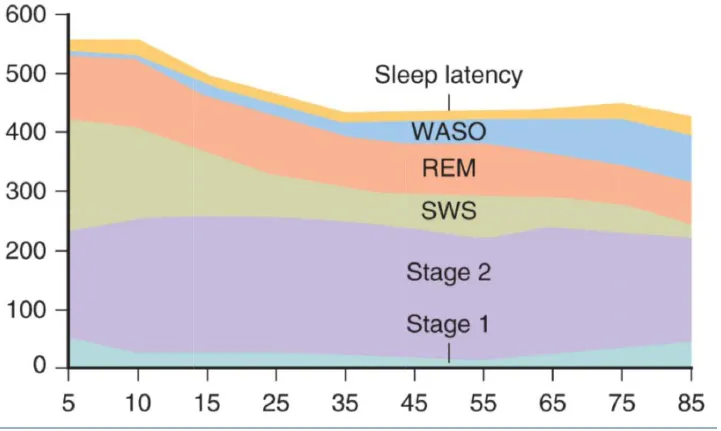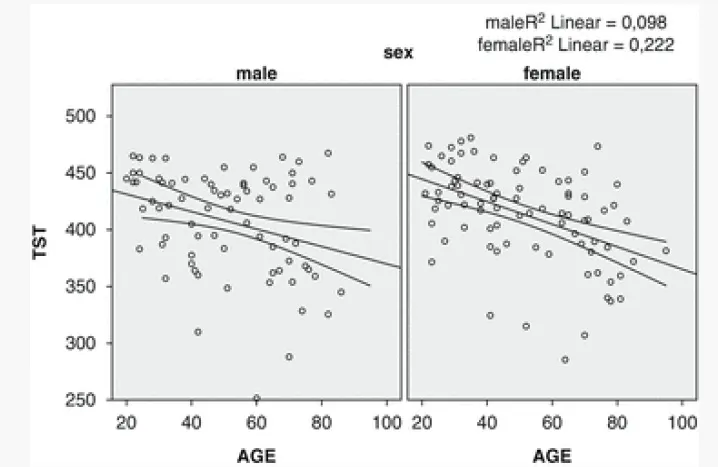Silver Sleepers: Sleep and Ageing
Sonia Ali Malik1, * 1 University of Utah, Salt Lake City, Utah. USA
Abstract
Sleep difficulties and disorders are among the most prevalent problems of ageing. In addition to changes in sleep duration and quality, sleep architecture also changes as age progresses. Age by itself does not result in sleep disorders; rather, these changes are associated with psychosocial and health factors in the elderly such as the existence of multiple comorbidities, polypharmacy, and age-related changes in circadian rhythm. Older adults have increased prevalence of various primary sleep disorders, including restless leg syndrome, insomnia, sleep-disordered breathing, circadian rhythm disturbances and periodic limb syndrome. Challenges in identifying, diagnosing, and treating sleep disorders in older adults with dementia also exist, which further complicates the management of sleep disorders in these patients. Poor sleep not only impacts the quality of life and cognitive functioning but is also associated with increased morbidity and mortality and thus requires careful screening and assessment in the elderly population.
Keywords: Ageing, Comorbidities, Dementia, Depression, Geriatric, Insomnia, Restless leg Syndrome, Sleep disorders, Sleep, Sleep Stages, Sleep-disordered breathing.
* Corresponding author Sonia Ali Malik: University of Utah, Salt Lake City, Utah. USA; Tel: 8015872865; Fax: +8015873349; E-mail: [email protected] INTRODUCTION
The population of older adults continues to grow rapidly. In the U.S., there are more than 46 million older adults age 65 and older and the number is expected to grow to almost 90 million by 2050 [1]. Sleep disorders in an ageing society constitutes a significant public health problem. Fifty percent of people aged 55 years and older have trouble sleeping, including initiating and maintaining sleep [2]. Sleep disorders and sleeping difficulty are among the most poorly addressed problems of ageing. In a National Institute on Ageing study of over 9,000 individuals aged 65 years and older, over one-half of the men and women reported at least one chronic sleep complaint [3]. Another cross-sectional study conducted on 360 people aged 60 or older, which utilized a self-made structured
questionnaire and interview, concluded that 70.3% of subjects suffered from sleep disorders and 81.81% of them had primary insomnia [4]. While increasing age is associated with changes in sleep architecture, age by itself does not result in sleep disorders; rather, these changes are associated with psychosocial and health factors in the elderly [5]. There are several factors that increase sleep disturbance with age, including polypharmacy, the prevalence of various medical and psychiatric conditions, age-related changes in circadian rhythms, and other environmental factors [6]. Although sleep disorders are prevalent in all age groups, older adults are particularly at higher risk with increased prevalence of sleep-disordered breathing, restless legs syndrome, periodic limb movements of sleep, sleep behaviour disorders, insomnia, and circadian rhythm disturbances [6]. Given the impact of sleep on quality of life, cognitive functioning and a growing body of research linking poor sleep with adverse health outcomes in the elderly; identifying sleep disorders in older adults is crucial to their overall wellbeing. Sleep disorders not only affect the overall quality of life, these disorders are also associated with increased mortality in the elderly [7].
AGE-RELATED CHANGES IN SLEEP
Ageing is associated with well-characterized changes in sleep architecture, sleep quality and sleep timing. Ageing is linked to a decreased ability to maintain sleep (increased awakening after sleep onset), advanced sleep timing (early to bed, early to rise), decreased sleep duration, increased sleep latency (increases time to sleep onset), sleep fragmentation, decreased sleep efficiency and decrease in deep sleep (slow-wave sleep).
Sleep Initiation and Maintenance
Various studies suggest a decrease in the ability to initiate and maintain sleep with ageing. Sleep in the older population is believed to be more disrupted [increased wake after sleep onset (WASO)] with an increase in duration to initiate and resume sleep after an awakening (increased sleep latency) (Fig. 1). A meta-analysis by Floyd et al. that pooled 41 published studies indicated that the ability to initiate sleep decreases with age; however, the magnitude of this change is small. Majority of the studies included in Floyd et al. meta-analysis utilized polysomnography (PSG) to measure the objective increase in sleep latency (SL) [8]. The meta-analysis also supported a positive correlation between age and increased waking frequency and duration [8]. Another meta-analysis by Ohayon et al. demonstrated a modest but significant change in sleep latency with age; however, these changes were subtle when compared over different age groups [9]. A mathematical model that represented 258 subjects aged 17 to 91 years, indicated a non-linear increase in sleep latency with age, suggesting an increase in sleep latency until about age 30, remaining steady from ages 30 until about 50 years, and then increasing progressively after the age of 50 years [10].
Fig. (1)) Age-related trends for stage 1 sleep, stage 2 sleep, slow wave sleep (SWS), rapid eye movement (REM) sleep, wake after sleep onset (WASO) and sleep latency (in minutes).From Ohayon M, Carskadon MA, Guilleminault C, Vitiello MV. Meta-Analysis of Quantitative Sleep Parameters From Childhood to Old Age in Healthy Individuals: Developing Normative Sleep Values Across the Human Lifespan Maurice. Sleep. 2004;27:1255-1273.
Sleep Efficiency
Sleep efficiency declines slowly with age. A meta-analysis by Ohayon and colleagues found a larger effect size of this decline in studies that compared young with elderly adults and young with middle-aged subjects [8].
Total Sleep Time
Compared with younger adults, older adults are known to have a decrease in total sleep time (TST) with age. Campbell and Murphy used the disentrainment protocol to study spontaneous sleep across young, middle-aged, and older adults, with the goal of determining the duration of spontaneous sleep. An effect of age was identified on total sleep time with older subjects obtaining 2.4 hours (hr) less sleep per 24hr compared with young subjects (old: 8.13h/24hr versus young: 10.53h/24 hr versus middle-age subjects 9.06 h/24 hr) [11]. Numerous meta-analyses further support the evidence of a substantial decline in TST over the adult lifespan [8, 12]. SIESTA project gathered data from ages 20-90 and found a reduction in total sleep time objectively as measured by polysomnography [13]. Their data showed a strong reduction in total sleep time with an age of about 8 minutes per decade for males and 10 minutes for females [13] (Fig. 2). The decrease in sleep duration has also been linked with a decline in cognitive function in older adults [14].
Fig. (2)) Age-dependency of total sleep time (TST, in minutes) for male (left) and female (right) subjects. Lines show the estimated regression lines with 95% confidence intervals.From Dorffner G, Vitr M, Anderer P. The effects of aging on...


